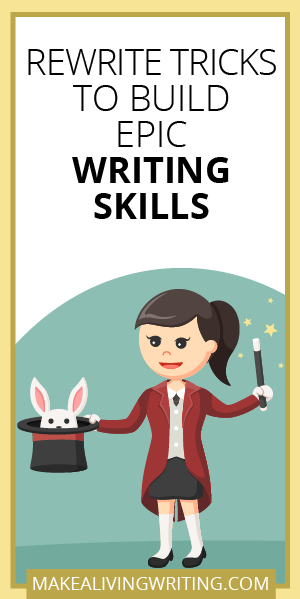 It’s been said that great writing isn’t about the writing — the magic is in the rewriting. None of us write a perfect first draft, so the buffing-and-polishing stage is where your piece goes from ‘yawn’ to fascinating. Over my 12 years as a staff writer, I learned some basic editing steps to take with my writing that reliably improve my work. Applying these to my articles over and over is really how I built my writing skills.
It’s been said that great writing isn’t about the writing — the magic is in the rewriting. None of us write a perfect first draft, so the buffing-and-polishing stage is where your piece goes from ‘yawn’ to fascinating. Over my 12 years as a staff writer, I learned some basic editing steps to take with my writing that reliably improve my work. Applying these to my articles over and over is really how I built my writing skills.
When you correct a writing error over and over in the rewrite phase, you get tired of having to make that effort, right? So you start incorporating the fix into your first draft. Soon, your work needs less rewriting. You get faster at knocking out your draft — and your hourly rate goes up.
Recently, one of my mastermind graduates asked to use her coaching time for a writing critique. Going over her draft with her reminded me of how many simple rewrite tricks I’ve picked up over the years.
It’s actually easy to spot and fix common writing errors in your own work, once you know how.
So, here’s a guide to seven ways to improve your writing skills with second-draft fixes:
1. Start at 10,000 feet and go down
Too often, we start picking apart our writing at the sentence or word level. How many times have you spent hours rewriting the first line or paragraph of an article you wrote, while the rest of the draft waits unwritten? Yeah, me too.
That’s not the fast way to create a strong final draft. Instead, try to spit out your whole first draft, quick as you can.
Then, begin your rewrite with the big picture. Read each paragraph and ask yourself, “Could this paragraph be cut?”
Often, we go off on side trails, or write a paragraph that doesn’t do much beyond recapping something we’ve said in an early paragraph. Chopping entire deadwood grafs out first saves you editing time.
Don’t feel sad about what you cut out — often, you can develop those side trails into new articles! So it’s not all bad news.
From there, proceed to look at your writing more closely.
2. Prevent reader dropoff
Once you’ve cut dead paragraphs, proceed to checking the first and last sentences of all your remaining paragraphs. First sentences need to be interesting, and last sentences need to smoothly pave the way to the opener of the next paragraph.
If you’ve made some cuts, you may have some ironing out of transitions to do here.
Abrupt switches between paragraphs mean you lose readers. They go, ‘huh?’ and give up. It’s worth a few minutes making sure each paragraph neatly sets up the next one.
3. Change up your sentences
If I had to name the top problem I see in writing reviews today, it’s sentences that are too long and winding. Especially when you’re writing online, short punchy sentences work better.
So. You can do this.
Writers with advanced degrees often need retraining on this, but writing for pay usually requires you keep it succinct.
Many writers have a habit of writing sentences in a particular structure — say, three long, connected clauses.
Or maybe you split up many sentences with a set of dashes — as I’m doing here — to inject a related thought mid-sentence. If that middle clause is long, sometimes readers start to lose the drift of your main thought. Use with caution.
Perhaps many of your sentences have a parenthetical phrase (hint: that gets annoying).
Do many of your sentences ask a question? Or end with an exclamation point! That starts to feel a bit amateurish.
Analyze your sentence-construction habits. Then, change it up. Readers will stick with you longer and find your piece more interesting.
4. Hunt and kill word tics
We all have words we use too often. Mine are “just” and “really.”
With this problem, I find it’s easier to just let it slide in the first draft. Then, do a quick pass through your piece in editing to hunt and remove most of the instances.
Get a thesaurus if you have to — but find other words to use that vary your language. It’ll keep readers more interested.
5. Trim your quotes
Many new writers are scared to boil down quotes. But remember, as long as you keep the gist of what the subject said, you’re okay. Most experts actually hope you’ll buff up their quotes and make them sound more intelligent than they really are.
Great quotes are short and punchy, not long and blather-y. One sentence can be amazing. Think of the quotes as the part of the article or blog post that people would want to tweet out to their friends.
Remember, you can always paraphrase the rest of what was said, as a setup to the quote.
You can quote me on this: “Short quotes are awesome and memorable.”
6. Stop just being
Passive and complex past-tense verbs are the enemy of good writing. Yet, they so often crop up in our first drafts. Even worse, I find new writers pack multiple ‘being’ verbs into a single sentence.
As in: “He was thinking about going to the store and getting a beer.”
Instead of: “He thought he might walk to the store and grab a beer.”
Passive verbs can often be cut:
As in: “She was getting tired of being the only one doing the work.”
Becomes: “She was tired of doing everyone else’s work.”
When it comes to verbs, think immediacy and action.
7. Inject personality
Your final stop in a good rewrite is to look at your word choices, especially the adjectives. They set the tone of the piece and reveal the personality or vibe.
Make a pass through your draft and just look at all the descriptive words and phrases. Do they convey the tone you wanted? If not, it’s time to tinker.
Improve your writing skills to earn more
I hope these rewrite tips give you a system for evaluating your draft that makes rewriting go faster.
Strive to speed up your writing process to improve your hourly rate. Especially if you write for publications, efficient writing will be key to earning well.
What rewrite tricks do you use to make your work better? Let’s discuss on Facebook and LinkedIn.

The post Try These 7 Smart Rewrite Tricks To Build Epic Writing Skills appeared first on Make A Living Writing.
from Make A Living Writing https://ift.tt/2tykLYA
 Photo by Dan Watson on Unsplash
Photo by Dan Watson on Unsplash
 It’s been said that great writing isn’t about the writing — the magic is in the rewriting. None of us write a perfect first draft, so the buffing-and-polishing stage is where your piece goes from ‘yawn’ to fascinating. Over my 12 years as a staff writer, I learned some basic editing steps to take with my writing that reliably improve my work. Applying these to my articles over and over is really how I built my
It’s been said that great writing isn’t about the writing — the magic is in the rewriting. None of us write a perfect first draft, so the buffing-and-polishing stage is where your piece goes from ‘yawn’ to fascinating. Over my 12 years as a staff writer, I learned some basic editing steps to take with my writing that reliably improve my work. Applying these to my articles over and over is really how I built my 
 Photo by
Photo by  Freelance marketing might feel like a chore. But it’s kind of important. If you don’t do it, you don’t eat. The good news, you can learn to love freelance marketing like I did.
Freelance marketing might feel like a chore. But it’s kind of important. If you don’t do it, you don’t eat. The good news, you can learn to love freelance marketing like I did.
 Photo by
Photo by  Photo by
Photo by  Are you tired of working teeny, one-off writing jobs for small publications and one-horse businesses? To
Are you tired of working teeny, one-off writing jobs for small publications and one-horse businesses? To 


 Photo by
Photo by  Ever wish you could be a fly on the wall at the home of some successful freelance writers, and figure out what they do to earn more?
Ever wish you could be a fly on the wall at the home of some successful freelance writers, and figure out what they do to earn more?